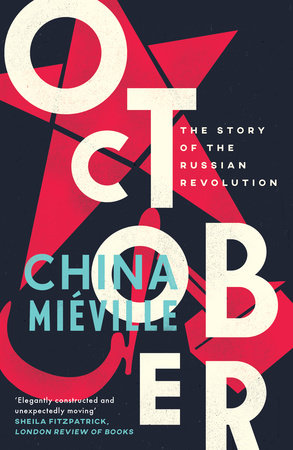Book review — October, by China Miéville
Topics: books

This is a book review that is not actually at all about the book itself. If you want that, I enjoyed reading this review, which I think captures the essence of the book itself.
I have been on a Russian-history kick lately, for obvious Ukraine-related reasons. Some other books I have read are Putin’s People and Putin and the Return of History. On the Ukrainian side, I went straight to the source with Anna Reid’s wonderfully readable Borderland: A Journey Through the History of Ukraine, and Ukraine also figures heavily in last summer’s reading, Bloodlands: Europe between Hitler and Stalin, by Timothy Snyder. At some point I do need to read a straight-through history of the Soviet Union, but after that little lot, I thought it was high time for me to look at the Revolution itself.
I was idly browsing around, and found October. I have loved China Miéville’s fiction since I picked up Perdido Street Station on a whim in a bookshop in Athens, so I thought I would check it out.
Unfortunately between ordering October and it arriving, some unsavoury allegations emerged about Neil Gaiman — and in the discussion, there were many hints about similar allegations made against China Miéville.
Now I have no first-hand knowledge of the truth or otherwise of any of these allegations, and it might be worth mentioning that China Miéville at least vehemently denies these allegations on his website. Sadly, this is not the first time an author I like suddenly turns out to be Problematic; the first was Warren Ellis, who to his credit basically disappeared from public life for more than a year, and later referred openly to his journey of understanding what he had done wrong and how he had got to that point.
What now?
At a time like this, I do think that the best I can do, as a man, is to cede the floor to a woman: Ann Leckie, who already said all that needed to be said.
The only thing that I can add is to say that it’s natural not to want to believe such allegations, not least because it means that we got it so badly wrong, that we missed signs that a public persona built on empathy was perhaps an act — or simply that a person can contain multitudes, not all of which are at all nice.
And then there’s the question of what next. In reality, “cancel culture” is mostly a right-wing culture-war bogeyman, but the kernel of truth at the heart of it is that I have limited time, and would rather invest it enjoying art that doesn’t lead to such questions in the first place — art created by people like Ann Leckie, for instance, whose Ancillary Justice is explosively, corruscatingly brilliant. There is no lack of art to be enjoyed out there, after all. While some Problematic artists may turn out to be defensible, why not focus on the art that does not require any defence in the first place?
Note, I am not calling for a boycott here, and I have not burned my cherished copies of Neverwhere or Good Omens. I will just, and for myself only, tend to prioritise these authors a little bit less in the future, and recommend them a little bit less frequently and enthusiastically.
I hate that it has come to this, and I also hate this lukewarm response that is somehow both too much and not nearly enough. It’s the hypocrisy that burns; finding out that Lemmy lived on a diet of hookers, meth, and Jack Daniels was perfectly consistent with the image of himself that he had always put out there. There was no deception, and thus no disappointed surprise. But the inconsistency bothers me intellectually, and the ability to portray an emotion that apparently was not (always?) true bothers me emotionally, and finally (because of course it is always about me) I hate that the image has once again been reinforced that all men are rapists, given only half an opportunity.
I have said before that I realised only stumblingly and long afterwards the magnitude of the compliment that female colleagues were paying me by having one-on-one drinks on work trips or whatever. In my mind we were gossiping about work like I would with any male colleague — and that is indeed what we did. Professional and personal relationships are forged over whisky that way — and I hate that female colleagues have to think twice about joining those sessions.
In conclusion: knock it off, you chumps. It’s not worth it to you, because sooner or later your actions will catch up with you. You are indubitably leaving a trail of victims behind, even if you tell yourself you’re not. And you’re making the rest of us men look bad, and that really pisses us off.
🖼️ Cover image from publisher’s website